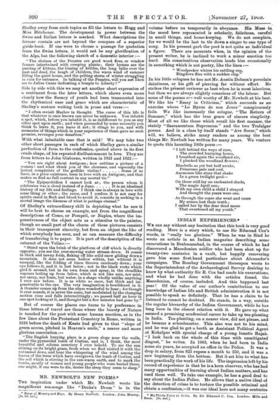MR. NEWBOLT'S NEW POEMS.*
THE inspiration under which Mr. Newbolt wrote his magnificent sea-songs like "Drake's Drum" is in the • Songs of Memory and Hope. By Henry Nev7bolt. London : John Murray. Os. tid. net.]
volume before us temporarily in abeyance. His Muse in, the mood here represented is scholarly, felicitous, careful in small things, and home-keeping. We do not complain, for we would be the last to tie down a singer to one type of song. In his present garb the poet is not quite so individual a figure. There are moments when, in the opinion of the present writer, he is inclined to work a minor emotion too hard. His conscientious observation lands him occasionally in something which is not poetry, like the lines :-
" Woodpecker whirrs his rattling rap, Bingdove flies with a sudden clap.'
In his little eclogues he has not Mr. Austin Dobson's porcelain daintiness, or his gift of piercing far without effort. He strikes the piesent reviewer as best when he is most laborious, but then we are always slightly conscious of the labour. But some of the poems are well worthy of Mr. Newbolt at his best.
We like his " Essay in Criticism," which succeeds as an exercise where " Le Byron de nos Jours " conspicuously fails. We like immensely the eclogue, " The Return of Summer," which has the true grace of sincere simplicity.
Most of all we like those which recall his first manner, the
stately " Sacramentum Supremum " and the two Trafalgar poems. And in a class by itself stands " Ave Soror," which
will, we believe, strike many readers as among the best things Mr. Newbolt has written for many years. We venture to quote this haunting little poem :— " I left behind the ways of care, The crowded hurrying hours, I breathed again the woodland air, I plucked the woodland flowers: Bluebells as yet but half awake, Primroses pale and cool, Anemones like stars that shake
In a green twilight pool—
On these still lay an enchanted shade, The magic April sun ;
With my own child a child I strayed And thought the years were one.
As through the copse she went and came My senses lost their truth ; I called her by the dear dead name That sweetened all my youth."














































 Previous page
Previous page